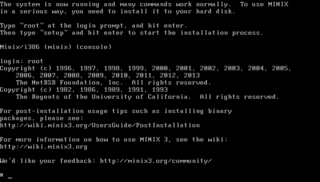Related Research Articles

Andrew Stuart Tanenbaum, sometimes referred to by the handle ast, is an American-Dutch computer scientist and professor emeritus of computer science at the Vrije Universiteit Amsterdam in the Netherlands.
Internetworking is the practice of interconnecting multiple computer networks, such that any pair of hosts in the connected networks can exchange messages irrespective of their hardware-level networking technology. The resulting system of interconnected networks are called an internetwork, or simply an internet.

Minix is a Unix-like operating system based on a microkernel architecture. Since version 2.0, it has been Portable Operating System Interface (POSIX) compliant.
In computing, source code is any collection of code, with or without comments, written using a human-readable programming language, usually as plain text. The source code of a program is specially designed to facilitate the work of computer programmers, who specify the actions to be performed by a computer mostly by writing source code. The source code is often transformed by an assembler or compiler into binary machine code that can be executed by the computer. The machine code might then be stored for execution at a later time. Alternatively, source code may be interpreted and thus immediately executed.

Leslie B. Lamport is an American computer scientist. Lamport is best known for his seminal work in distributed systems, and as the initial developer of the document preparation system LaTeX and the author of its first manual. Lamport was the winner of the 2013 Turing Award for imposing clear, well-defined coherence on the seemingly chaotic behavior of distributed computing systems, in which several autonomous computers communicate with each other by passing messages. He devised important algorithms and developed formal modeling and verification protocols that improve the quality of real distributed systems. These contributions have resulted in improved correctness, performance, and reliability of computer systems.

Theoretical computer science (TCS) is a subset of general computer science and mathematics that focuses on mathematical aspects of computer science such as the theory of computation, lambda calculus, and type theory.
In distributed computing, a single system image (SSI) cluster is a cluster of machines that appears to be one single system. The concept is often considered synonymous with that of a distributed operating system, but a single image may be presented for more limited purposes, just job scheduling for instance, which may be achieved by means of an additional layer of software over conventional operating system images running on each node. The interest in SSI clusters is based on the perception that they may be simpler to use and administer than more specialized clusters.

Per Brinch Hansen was a Danish-American computer scientist known for his work in operating systems, concurrent programming and parallel and distributed computing.
ChorusOS is a microkernel real-time operating system designed as a message passing computing model. ChorusOS began as the Chorus distributed real-time operating system research project at the French Institute for Research in Computer Science and Automation (INRIA) in 1979. During the 1980s, Chorus was one of two earliest microkernels and was developed commercially by startup company Chorus Systèmes SA. Over time, development effort shifted away from distribution aspects to real-time for embedded systems.
The actor model in computer science is a mathematical model of concurrent computation that treats actor as the universal primitive of concurrent computation. In response to a message it receives, an actor can: make local decisions, create more actors, send more messages, and determine how to respond to the next message received. Actors may modify their own private state, but can only affect each other indirectly through messaging.
In distributed computing, the bully algorithm is a method for dynamically electing a coordinator or leader from a group of distributed computer processes. The process with the highest process ID number from amongst the non-failed processes is selected as the coordinator.

Prentice Hall is an American major educational publisher owned by Savvas Learning Company. Prentice Hall publishes print and digital content for the 6–12 and higher-education market, and distributes its technical titles through the Safari Books Online e-reference service.
The National Transplant Organization is an independent coordinating agency of the Spanish Ministry of Health responsible for developing the competencies related with provision and clinical utilization of organs, tissues and cells. The agency is headed by the Secretary-General for Health and Consumer Affairs, Faustino Blanco, although the chief executive of the agency is the Director, currently Dr. Beatriz Domínguez-Gil.

Paul Michael Béla Vitányi is a Dutch computer scientist, Professor of Computer Science at the University of Amsterdam and researcher at the Dutch Centrum Wiskunde & Informatica.

Dimitri Panteli Bertsekas is an applied mathematician, electrical engineer, and computer scientist, a McAfee Professor at the Department of Electrical Engineering and Computer Science in School of Engineering at the Massachusetts Institute of Technology (MIT), Cambridge, Massachusetts, and also a Fulton Professor of Computational Decision Making at Arizona State University, Tempe.

Jeffrey Adgate "Jeff" Dean is an American computer scientist and software engineer. He is currently the lead of Google AI, Google's AI division.
Jean Bacon is a British emeritus professor of distributed systems at the Computer Laboratory at the University of Cambridge, where she co-headed the Opera Research Group from its founding in the 1990s. Previously, she taught at Hatfield Technical College where, in the 1970s, she was involved in the design of one of the earliest computer science degree programs offered in the United Kingdom. Bacon retired from her faculty position at Cambridge in 2010 but has continued to work on Opera projects related to distributed systems and security in cloud computing.

Ian J. Goodfellow is a computer scientist, engineer, and executive, most noted for his work on artificial neural networks and deep learning. He was previously employed as a research scientist at Google Brain and director of machine learning at Apple and has made several important contributions to the field of deep learning including the invention of the generative adversarial network (GAN). Goodfellow wrote the chapter on deep learning in the most popular textbook in the field of artificial intelligence, Artificial Intelligence: A Modern Approach, as well as the textbook Deep Learning.
Tim Kindberg is a computer scientist, notable for being co-author of one of the standard distributed computer systems textbooks, Distributed Systems (ISBN 978-0132143011). Kindberg has been cited over 10,000 times.
Gordon Blair is a Distinguished Professor of Distributed Systems in the School of Computing and Communications at Lancaster University. He is also the co-director of the Centre of Excellence in Environmental Data Science (CEEDS).
References
- ↑ "Jean Dollimore". ResearchGate. Retrieved 25 August 2019.
- ↑ "Jean Dollimore bibliography". Google Scholar. Retrieved 25 August 2019.